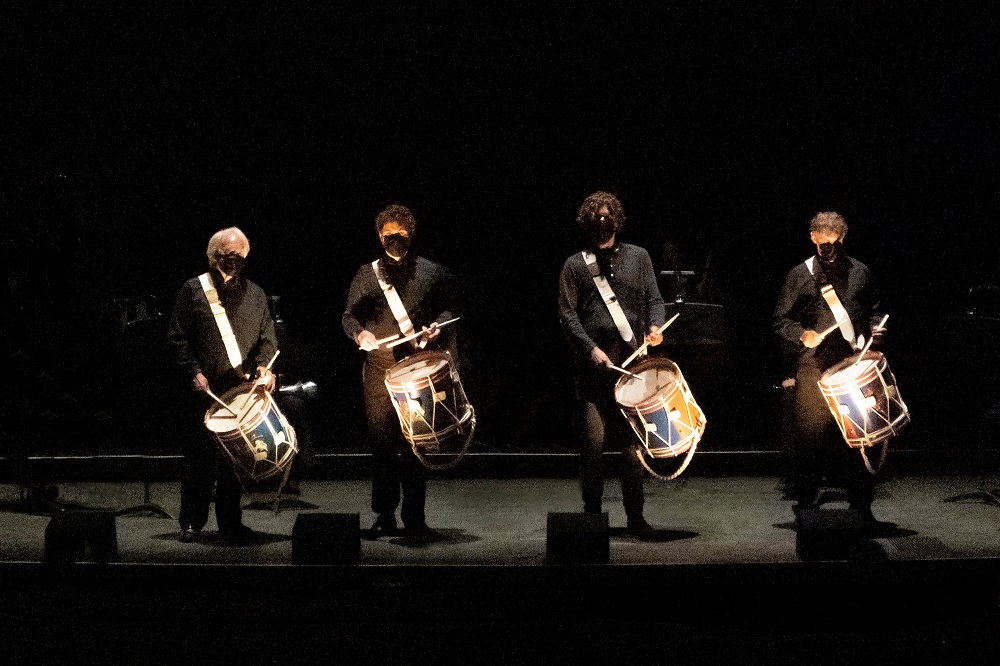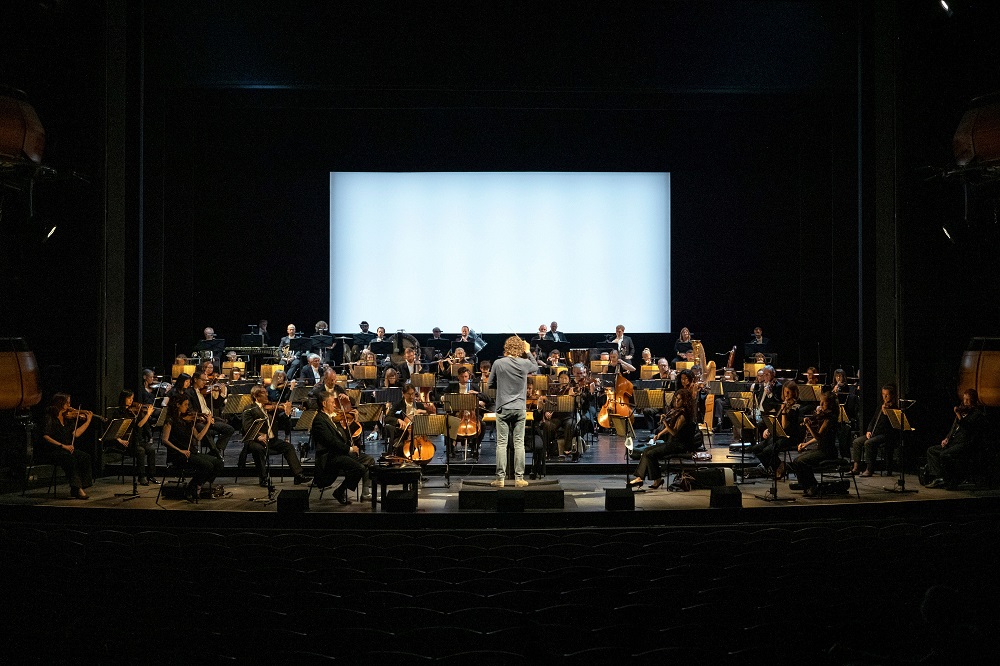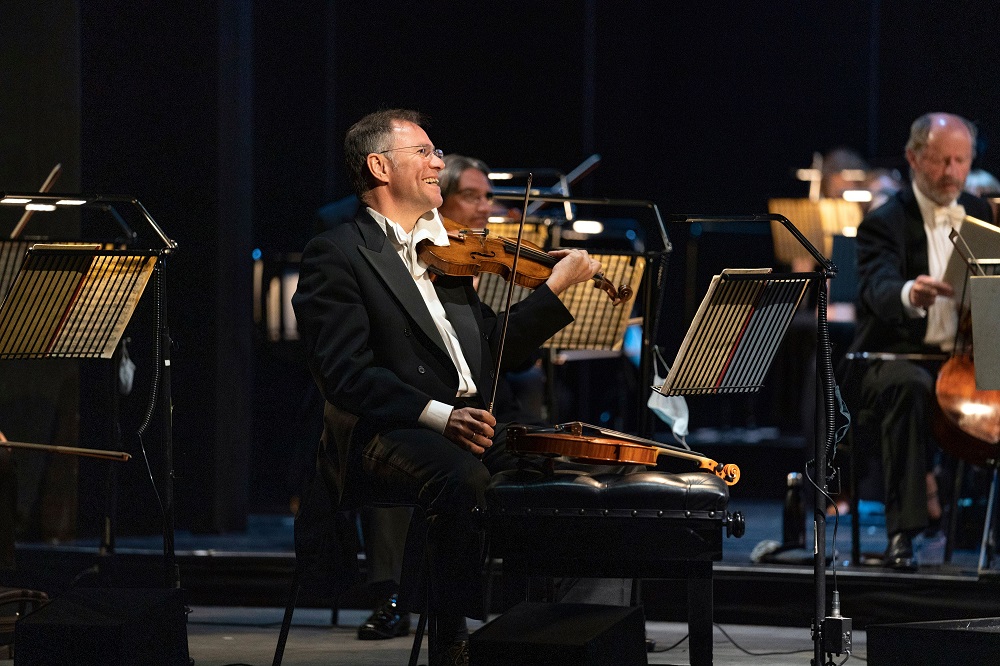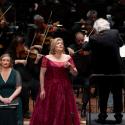Why travel to Glyndebourne for a concert? Well, for a start, none of us has heard a Mahler symphony live in full orchestral garb for at least 15 months, and though the Fourth is smaller-scale than some, its innocent beginnings belie the cosmic adventures ahead. Only a handful of us got to see the London Philharmonic Orchestra in the Royal Festival Hall during the semi-lockdown period; its departing music director Vladimir Jurowski had to make do with overwrought film presentation only when he bowed out with Tchaikovsky’s complete Swan Lake ballet score. And any programme which segues from Purcell’s Music for Queen Mary’s Funeral into Harrison Birtwistle’s Cortege, his 2007 reworking of the earlier Ritual Fragment, has to be out of the ordinary.
As it turned out, the overall presentation was theatrical too, even operatic, without gimmickry and often beautiful to look at. I’m glad it will be there for all to see on Marquee TV, but nothing can surpass the concordance of nature’s wonders on a brilliant June day beneath the South Downs with some of the music we heard, ending in a song that revolved in the mind during a final garden stroll at sunset.  Epic drumming from four processing players in front of a black curtain (Richard Hubert Smith's rehearsal image pictured above, with Ticciati third from left) conjured up richly-projecting brass playing from the gods – in other words the upper circle – in the Purcell. The thudding ritual was answered by a big bass drum, played by a masked Robin Ticciati as what Alexandra Coghlan’s note calls the "musical high priest" marshalling 14 seemingly unruly instrumentalists already on stage. Birtwistle brings 12 of them, overlapping, into the limelight, starting with brilliant LPO trumpeter Paul Benniston (later we heard an extraordinary bass trumpet solo from David Whitehouse). Without the visuals, you might be lost in the thorny melee – the string soloists don’t stand out in the throng – and without any harmonic stability, the only signposts are the punctuation of the bass drum and the occasional thinning out of textures. But as sound and spectacle combined, Cortege rivets the attention.
Epic drumming from four processing players in front of a black curtain (Richard Hubert Smith's rehearsal image pictured above, with Ticciati third from left) conjured up richly-projecting brass playing from the gods – in other words the upper circle – in the Purcell. The thudding ritual was answered by a big bass drum, played by a masked Robin Ticciati as what Alexandra Coghlan’s note calls the "musical high priest" marshalling 14 seemingly unruly instrumentalists already on stage. Birtwistle brings 12 of them, overlapping, into the limelight, starting with brilliant LPO trumpeter Paul Benniston (later we heard an extraordinary bass trumpet solo from David Whitehouse). Without the visuals, you might be lost in the thorny melee – the string soloists don’t stand out in the throng – and without any harmonic stability, the only signposts are the punctuation of the bass drum and the occasional thinning out of textures. But as sound and spectacle combined, Cortege rivets the attention.
Applause broke out for the full string orchestra revealed behind the curtain for Vaughan Williams’ Fantasia on a Theme of Thomas Tallis, the screen behind them lit appropriately enough in blue and green. Glyndebourne acoustics are dry but never ungiving – that quality of special audibility and sheen of the middle voices, here violas and cellos, has been striking from the very first operas there. Behind the proscenium arch of the stage – and heard, in this case, from under the overhang in the stalls circle – the players have to work harder and you focus more on line than sonority. But the solos, led by principal viola Richard Waters, seemed especially unearthly, and the echo effects in the work were conjured by intense pianissimos alone to make up for lack of any halo of sound in the building.  Everything worked in the Mahler Four (pictured above in rehearsal), a body of first and second violins, crucially antiphonal, on an apron at the front of the stage, dangerously exposed but flawless in the full range of dynamics that Mahler asks for and Ticciati so painstakingly observes. The conductor always knows his mind and had clearly worked intensively on detail: if there was no carrying of the sound from the top of the first main phrase downward, we got plenty of those gorgeous portamenti where it mattered. The many slight tempo changes were masterfully done; as the childlike sleigh-ride with its Schubertian companion head into the dark woods, Ticciati made much of the sombre swing into lower pizzicati supporting an ominous horn solo. The first-movement climax sounded full and brilliant, bass drum and trumpet forging a link with the Birtwistle, before an impressive scattering to the winds and heart-on-sleeve ripeness for the return of the purposefully old-fashioned big tune (Ticciati reminded us how daringly neoclassical Mahler was before Stravinsky, Prokofiev and others had the label applied to them).
Everything worked in the Mahler Four (pictured above in rehearsal), a body of first and second violins, crucially antiphonal, on an apron at the front of the stage, dangerously exposed but flawless in the full range of dynamics that Mahler asks for and Ticciati so painstakingly observes. The conductor always knows his mind and had clearly worked intensively on detail: if there was no carrying of the sound from the top of the first main phrase downward, we got plenty of those gorgeous portamenti where it mattered. The many slight tempo changes were masterfully done; as the childlike sleigh-ride with its Schubertian companion head into the dark woods, Ticciati made much of the sombre swing into lower pizzicati supporting an ominous horn solo. The first-movement climax sounded full and brilliant, bass drum and trumpet forging a link with the Birtwistle, before an impressive scattering to the winds and heart-on-sleeve ripeness for the return of the purposefully old-fashioned big tune (Ticciati reminded us how daringly neoclassical Mahler was before Stravinsky, Prokofiev and others had the label applied to them).
Leader Pieter Schoeman, so brilliant in the many Swan Lake solos for Jurowski, stamped and sawed as Death leading the dance in the temple, switching from his retuned fiddle from the “normal” one on a stool beside him with great deftness (pictured below). The intervening trios where he plays more sweetly could hardly have been lovelier. Screen lighting for the symphony started neutrally bright, red sweeping the canvas as devilment enters the scene; why, though an oblong sun appeared against blue during the first of the two deeply sorrowful episodes of the slow movement and grew bigger in the second remained puzzling; these are partial eclipses of the serene mood and its two variations. No matter; the seraphic opening quickly swelled to vibrato-rich humanity, and the ineffable oboe-playing of Tom Blomfield proved peerless in both secret rapture and naked grief.  The seraphic heights after the opening of heaven’s gates may have been brutally punctuated by a heavy object falling from above, fortunately on to empty seats below, but Ticciati held the magic. Sally Matthews, replacing an indisposed Elizabeth Watts, knows the childlike song relishing the joys of heaven at the end very well indeed; the meaning was clear at every turn, the hushed final verse absolutely spellbinding. When the final lullaby ended on low harp and softest double basses, the ensuing silence seemed to last for ever, and the volatile emotions we’d experienced also had their sustained release in that silence. A great interpretation of a unique masterpiece, no doubt about it.
The seraphic heights after the opening of heaven’s gates may have been brutally punctuated by a heavy object falling from above, fortunately on to empty seats below, but Ticciati held the magic. Sally Matthews, replacing an indisposed Elizabeth Watts, knows the childlike song relishing the joys of heaven at the end very well indeed; the meaning was clear at every turn, the hushed final verse absolutely spellbinding. When the final lullaby ended on low harp and softest double basses, the ensuing silence seemed to last for ever, and the volatile emotions we’d experienced also had their sustained release in that silence. A great interpretation of a unique masterpiece, no doubt about it.














Add comment